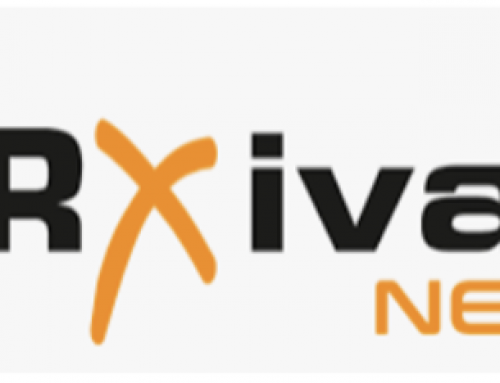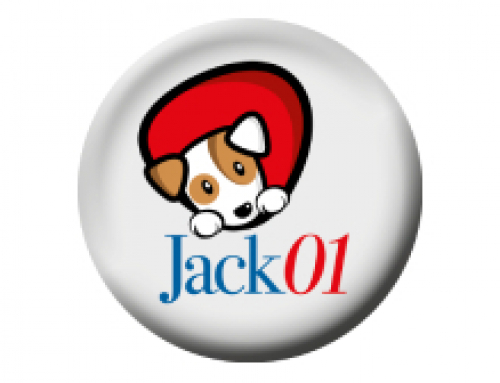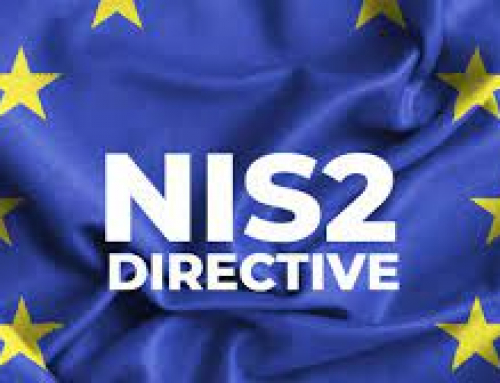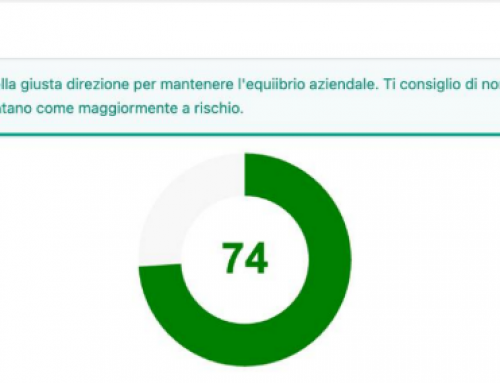Having a clear understanding of the concepts underlying license management in the IBM i world is essential for effective and proper software usage. The goal of this article is to provide an overview of this topic.
The IBM i Portfolio
The IBM i portfolio consists of three different types of software:
- The basic operating system with its separately orderable additional features.
- Licensed Program Products (LPPs) that complement the basic operating system (e.g., IBM i Access, IBM Rational Development Studio for i, PowerHA, …).
- Other products:
- IBM products licensed under Passport Advantage (PPA) (e.g., WebSphere MQ, Rational Tools, Merlin, …).
- Third-party products (e.g., replication software, …).
IBM i Licensing
IBM i licensing is based on the category (which, in turn, depends on the machine model type) of the hardware on which the operating system must be licensed. IBM Power systems are divided into three different categories: Small, Medium, and Large.
Additionally, for IBM i, the Processor Group (Software Tier) is crucial and corresponds to the HW category:
- Small – Processor Group P05/P10/P20
- Medium – Processor Group P30
- Large – Processor Group P50 (no longer used on newer IBM Power models)
For all system categories, an entitlement (license) is required for each processor that uses the IBM i operating system.
For models in Processor Groups P05 and P10, in addition to processor entitlement, there is also a requirement for entitlement for the maximum number of IBM i users authenticated simultaneously on the system. A user is an individual who accesses IBM i, either directly through one or more connections, exchanging credentials directly with IBM i or indirectly through an application or software (e.g., Active Directory) supported by IBM i itself.
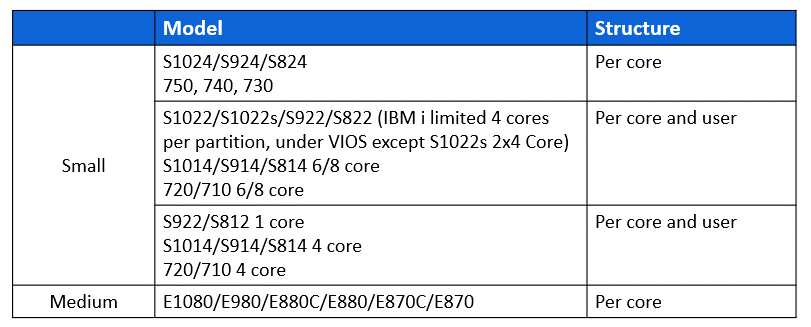
These general Terms & Conditions are modified by specific offerings such as Capacity Backup (CBU), Power Enterprise Pools, Live Partition Mobility, …
For more information on the IBM i licensing process, please refer to the website:
License Information documents
https://www.ibm.com/support/customer/csol/terms/#license-search
https://www.ibm.com/support/customer/csol/terms/?id=L-LHIH-BWXQED&lc=it#detail-document
Licensing of IBM i Licensed Program Products (LPPs)
For LPPs that complement the basic operating system, there are no uniform licensing rules:
- Some must be licensed as standalone products.
- Some (“Bonus Programs”) are automatically licensed along with the operating system.
- Some are paid, while others are free.
- Some are protected by a license key, while others are not.
- The licensing method varies depending on the product (e.g., by system, by LPAR, by core, by user, …).
Starting from June 2022, IBM has made several LPPs and optional features of the operating system free, effectively considering them an integral part of the operating system itself.
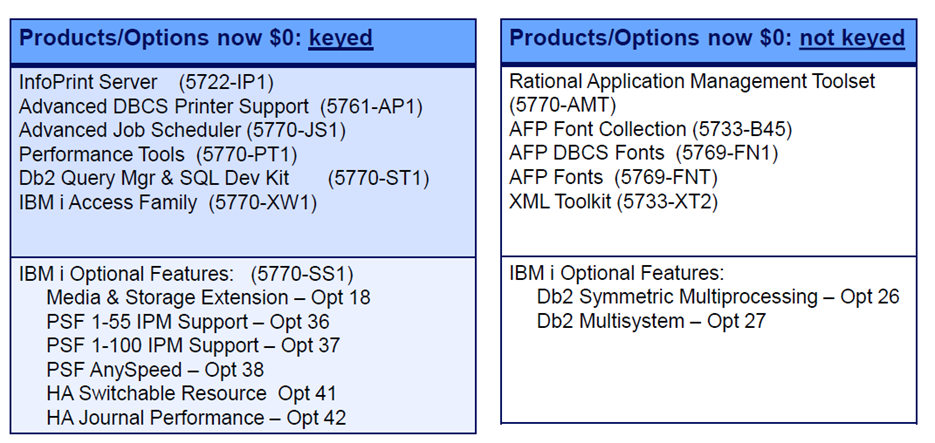
IBM i Subscription
Starting from May 2022, a new licensing mode for the IBM i operating system has been introduced. In addition to the “traditional” perpetual licenses (with no expiration date), licenses with limited durations (1, 2, 3, 4, or 5 years) that include software maintenance (9×5 support) have been added. These are called IBM i Subscriptions. With the introduction of Subscriptions, IBM i also aligns with the growing market demands; companies are becoming less interested in owning products and more interested in using them with satisfaction and flexibility (Subscription Economy). This shift represents a move towards operating expenses (OpEx) investment rather than capital expenses (CapEx), with the benefits that can be derived from it.
As of today, this licensing mode is available for all POWER9 and Power10 models in Processor Groups P05/P10/P20/P30 and for the following software products:
- IBM i operating system
- Rational Development Studio for i
- Rational Developer for i
- Modernization Engine for Lifecycle Integration (Merlin)
- Entitled Systems Support (ESS)
The ESS portal is an essential tool for verification and management of all aspects related to IBM Power software, including entitlements, electronic Proof of Entitlement (ePoE), license key management, verification of active software maintenance, and downloads of software updates/new products.
IBM i Evaluation (Try & Buy) and National Language Version (NLV) Downloads are also available through the ESS portal. The ESS portal is managed by a team of IBM specialists (Key Center) who can be contacted via email at WWSWKEYS@dk.ibm.com or by phone when needed.
Transfer of IBM i Licenses
IBM i’s Terms & Conditions stipulate that operating system licenses remain tied to the server for which they were originally purchased. However, in specific conditions, IBM allows the transfer of IBM i licenses (processor and user) from one system (donor) to another (target). This possibility facilitates technological renewal of IBM Power systems and the consolidation and workload balancing while safeguarding customer investments.
The essential requirements for transferring IBM i licenses from a donor system to a target system are:
- Both systems, donor and target, must belong to the same customer or customers belonging to the same Corporate Group (1).
- The customer must have owned the donor system for at least one year.
- The licenses to be transferred from the donor system must be covered by software maintenance.
(1) A Corporate Group is defined as any legal entity (including individuals, companies, businesses) and its subsidiaries. A subsidiary refers to any legal entity owned or controlled, directly or indirectly, by the corporate group that holds more than 50% of the votes or, if not votes, decision-making power.
The transfer of IBM i licenses is allowed only within specific Transfer Groups, determined based on the Processor Group of the donor and target systems. For more details, consult the document “IBM i Processor Entitlement Transfer.”
Temporary Licenses
In particular situations, such as the need to run production workloads concurrently on both the donor and target systems for a period longer than the 30 days specified in the rules for transferring IBM i licenses, or the need to temporarily manage workloads that require additional software beyond what is licensed on the system, temporary licenses (product code 5733 ITL) can be ordered for both the IBM i operating system and Licensed Program Products (LPP). The minimum duration of the license is one month, and the maximum quantity that can be ordered is 12 months. The “counter” that determines the duration of the ordered ITL license starts when the license is activated directly by the customer through the ESS portal. Only at this moment is a temporary license key generated, with a duration equivalent to that of the ordered license.
The list of products available for ITL mode is published on the website “IBM i Temporary Licensing Eligible Programs.”
IBM i Software Maintenance
An active software maintenance contract for IBM i licenses entitles you to:
- Download new versions, releases, and Technology Refreshes; this is essential to keep your systems up to date and make the most of the technology opportunities.
- Access to corrections (PTFs) released by IBM.
- Technical support in case of malfunctions.
- Transfer of IBM i processor and user licenses from a donor system to a target system (following the rules described above).
- Release of license keys for previous releases.
Currently, the supported IBM i releases are 7.4 and 7.5. For IBM i 7.3, 7.2, and 7.1 (7.1 only on selected POWER9 models), in addition to software maintenance, it is possible to subscribe to a Service Extension, which provides limited-time coverage for technical support from IBM for releases already declared End of Service.
For more details on Service Extensions, please consult the website: “https://www.ibm.com/support/pages/system/files/inline-files/IBMiandLPPsforIBMi_0.pdf”
Available Documentation
All documentation related to IBM i licensing (and more!) is collected on the IBM i license topics website.
From: Nicoletta Bernasconi



